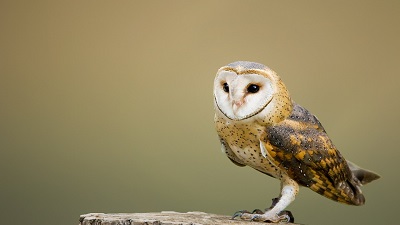Category : Wildlife | Location : Delhi | Posted on 2021-08-05 00:11:27

New Delhi, Aug 5 (PTI) Sixteen species of owls have been identified that are commonly trafficked in illegal wildlife trade in India, WWF India has said highlighting that the birds are victims of superstitious beliefs and rituals.
To raise awareness about these owl species and help with their identification, TRAFFIC and WWF-India have created an informative poster called 'Imperilled by illegal wildlife trade: Owls of India'.
TRAFFIC, an organisation that works to ensure wildlife trade is not a threat to the conservation of nature, has identified 16 species of owls that are commonly trafficked in the illegal wildlife trade in India.
"The poaching and trafficking of owls in India have become a lucrative illicit trade resting on the wings of superstition," said Dr Saket Badola, Head of TRAFFIC's India Office.
He said, "Lack of awareness about owls in the illegal wildlife trade and the limited capacity of enforcement agencies to identify them has made this illegal activity difficult to detect or curb. We are hopeful that our new identification poster will help to bridge this enforcement gap."
"Owls in India are victims of superstitious beliefs and rituals often promoted amongst the unsuspecting public by local mystic practitioners," the organisations was quoted as saying in an official statement.
They said that out of the approximately 250 owl species found worldwide about 36 are found in India.
All owl species in India are protected under the Wildlife (Protection) Act, 1972, making poaching, trade, or any other form of exploitation a punishable offence. They are also listed in Appendix II of CITES, thus tightly regulating their international trade.
Despite the legal restrictions, every year, hundreds of birds are sacrificed for mystic rituals and practices linked with superstition, totems, and taboos across the country, and this usually peaks around the festival of Diwali, WWF India said.
Especially in smaller towns and villages, the use of owl parts such as the skull, feathers, ear tuffs, claws, heart, liver, kidney, blood, eyes, fat, beak, tears, eggshells, meat, and bones are prescribed for ceremonial pujas and rituals.
Ravi Singh, Secretary-General and CEO of WWF-India, said, "Owls as birds of prey play a crucial role in balancing our ecosystem and as friends of farmers, keeping rodents in check."
"They also have a strong cultural significance and often elicit strong emotions ranging from fascination, awe, hate, to disdain. The continuing trend of these birds being exploited for illegal trade needs to be negated through concerted action. A strong citizen support, generated through public awareness can go a long way in their conservation," he said.
Dr Dhananjai Mohan, Director, Wildlife Institute of India, said that owls keep a check on agricultural pests, reducing the dependence on pesticides.
"It is important to conserve and protect the species and such initiatives by TRAFFIC and WWF-India are impactful and will hopefully contribute towards curbing illicit trade of owls in the country," he said.
TRAFFIC and WWF-India organised a webinar 'Owls in Illegal Wildlife Trade' on Wednesday with subject experts such as Dr Dhananjai Mohan, Director, WII; Dr Prachi Mehta, Executive Director- Research, WRCS; Mr Ravi Singh, Secretary General and CEO, WWF-India; Dr Saket Badola, Head, TRAFFIC, India Office and Dr Merwyn Fernandes, Coordinator, TRAFFIC India Office.
In the webinar, experts deliberated on poaching and trafficking of owls in India, and the initiatives required to curb this menace.
The poster 'Imperilled by illegal wildlife trade: Owls of India' is available freely for the enforcement agencies such as forest departments, police, Wildlife Crime Control Bureau (WCCB), Sashastra Seema Bal (SSB) and the Railway Protection Force (RPF), the WWF India said.
Source: https://www.outlookindia.com/newsscroll/16-owl-species-commonly-trafficked-in-illegal-wildlife-trade-in-country-wwf-india/2135267